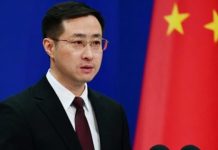-Says Pakistan struggled to bring both parties towards dialogue
-Expresses joy over the flexibility shown by both conflicting parties
-Argues Afghan govt, Taliban responded to people’s yearning for peace
DM Monitoring
Islamabad: Prime Minister Imran Khan has warned that a hasty international withdrawal from Afghanistan would be “unwise” and cautioned against setting unrealistic timelines.
In an op-ed published in The Washington Post on Saturday, the premier said that the path leading to the talks between the Afghan leadership and the Taliban was not easy but “we were able to press on thanks to the courage and flexibility that were on display from all sides”.
He pointed out that the United States and its allies had facilitated the prisoner exchange which the Taliban had linked to resumption of the peace talks while both the Afghan government and the Taliban had “responded to the Afghan people’s yearning for peace”. Earlier this month, the talks between the Afghan warring factions for ending the 19-year-old conflict in Afghanistan finally got under way in Doha, Qatar amid calls for immediate ceasefire and preserving the gains made by Afghanistan over the past couple of decades.
The start of the talks after protracted delays marked a major progress towards the end of conflict in Afghanistan. The talks were to originally start on March 10 following the US-Taliban agreement, but disputes over prisoners’ release kept them delaying. The release of the final batch of six “dangerous” Taliban prisoners and their transfer to Qatar paved the way for the negotiation teams to begin their talks.
In Saturday’s op-ed, the premier said that the intra-Afghan negotiations were “likely to be even more difficult, requiring patience and compromise from all sides”.
“Progress could be slow and painstaking; there may even be the occasional deadlock, as Afghans work together for their future. At such times, we would do well to remember that a bloodless deadlock on the negotiating table is infinitely better than a bloody stalemate on the battlefield,” he wrote. He added that all sides who were invested in the Afghan peace process should “resist the temptation for setting unrealistic timelines”. He also warned of regional spoilers, who he said saw instability in Afghanistan as an advantage for their own political purposes.
The premier highlighted that it was important to start planning for what would happen in postwar Afghanistan. “How can the world help a postwar Afghanistan transition to sustainable peace? How do we create conditions that will enable the millions of Afghan refugees living in Pakistan, and other countries, to return to their homeland with dignity and honour?”
He assured that Pakistan would continue to support the Afghan peace process. “Like the United States, Pakistan does not want to see Afghanistan become a sanctuary for international terrorism ever again.”
He also spoke about the price that Pakistan had paid for the conflict in its neighbouring country. “Through decades of conflict, Pakistan has dealt with the responsibility of taking care of more than four million Afghan refugees. Guns and drugs have also flowed into our country. The wars have disrupted our economic trajectory and radicalised fringes of our own society.”
The prime minister said that decades of conflict had taught two lessons. “First, that we were too closely intertwined with Afghanistan by geography, culture and kinship for events in that country not to cast a shadow on Pakistan. We realised Pakistan will not know real peace until our Afghan brothers and sisters are at peace.
“We also learned that peace and political stability in Afghanistan could not be imposed from the outside through the use of force. “Only an Afghan-owned and Afghan-led reconciliation process, which recognises Afghanistan’s political realities and diversity, could produce a lasting peace,” he said.
The premier disclosed that Pakistan did not hesitate to assure US President Donald Trump in 2018 that it would “make every effort” to facilitate a negotiated political settlement in Afghanistan.
Highlighting Pakistan’s contribution in the fight against terrorism, he said that “more than 80,000 Pakistani security personnel and civilians have laid down their lives in perhaps the largest and most successful fight against terrorism”.
However, the country continued to be the target of attacks launched by “externally enabled terrorist groups based in Afghanistan”, he said. He expressed the hope that the Afghan government would take measures to control the areas within the country that were used to launch “attacks against the Afghan people, the international coalition forces stationed in Afghanistan, and other countries in the region, including Pakistan”. “Like the United States, we do not want the blood and treasure we have shed in the war against terrorism to be in vain,” he said. The premier added that Pakistan was “committed to multilateral collaboration” to achieve peace and stability in the region.
Meanwhile, Prime Minister Imran Khan has said that the various initiatives taken by the Government of Pakistan for promotion of tourism were giving emphasis to development of rural areas. “Several new destinations have been explored for tourists in rural areas of the country which is expected to uplift the economic and social status of local population,” he said in a message on the observance of ‘World Tourism Day’ on September 27. He said today, they were celebrating the Day as a country that hosted some of the world’s most kook vistas and fascinating cultures. This day was celebrated every year by all member states of the United Nation’s World Tourism Organization.Pakistan always joined hand with the world community to celebrate the day with zeal and fervour. The theme of this year is ‘Tourism and Rural Development’. The prime minister said the tourism sector provided Impetus to economic development in rural areas, which was in dire need of economic activities.
Tourism not only helped in empowerment of rural communities by generating employment and boosting trade, but also enabled them to protect their heritage and allowed other people to experience their incredible cultures and traditions, he added. He further said placing rural development at the heart of tourism policies through education, investment, innovation, technology and employment transformed the livelihoods of millions and helped preserve the culture and environment. The prime minister said he would like to inform the international community that the people of Pakistan were waiting for the tourists from around the globe anxiously to extend their hospitality for visiting their mountains, deserts, rivers, forests, and coasts.




